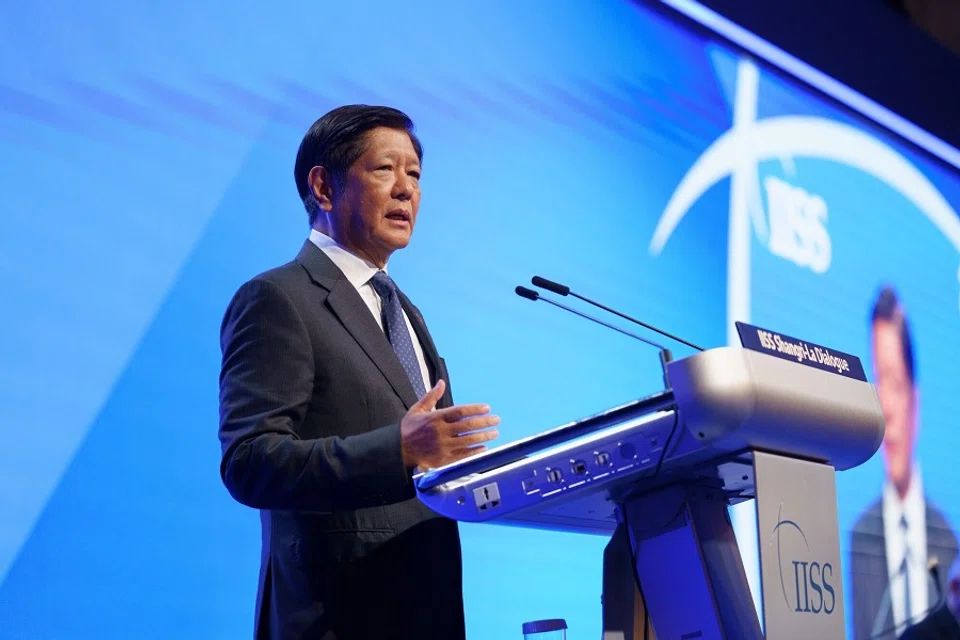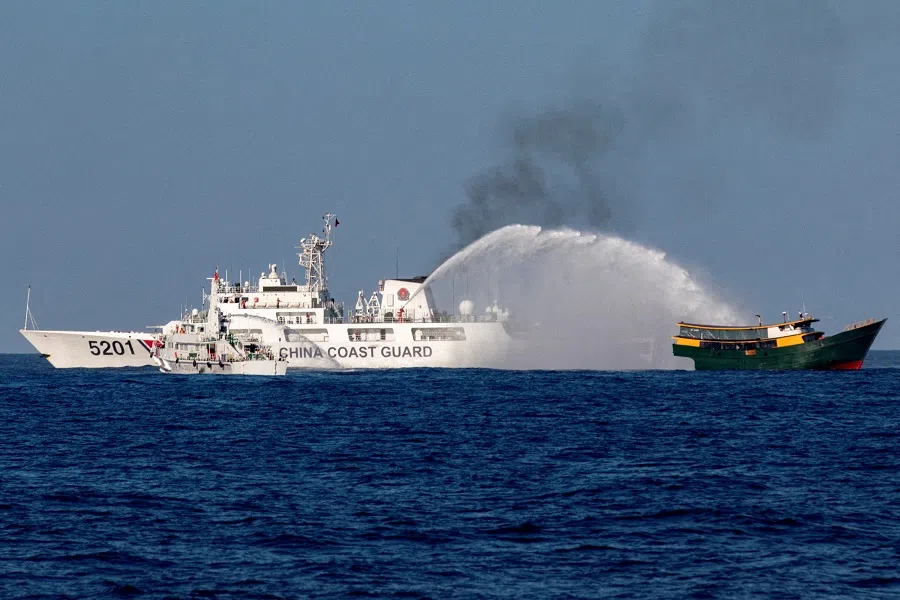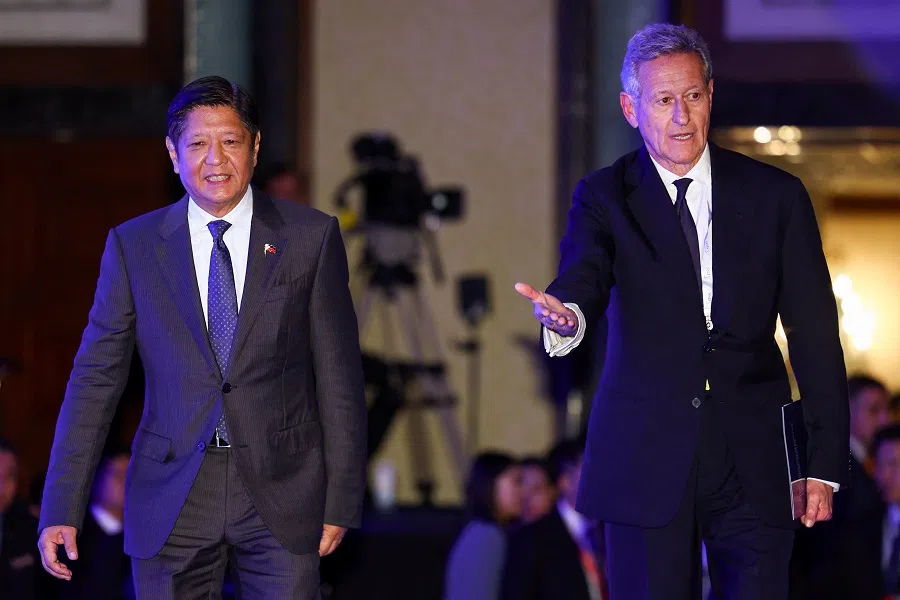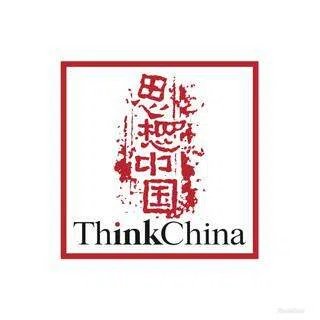Philippines must exercise its agency in a ‘rules-broken’ international order
Philippine academic Elaine Tolentino says President Ferdinand Marcos Jr made it clear at the Shangri-La Dialogue in Singapore that efforts to resolve the South China Sea dispute should be “anchored on international law, particularly UNCLOS”. In the face of discrepancies between China’s rhetoric and practice, the Philippines should continue to exercise its agency in protecting its maritime domain.

On 31 May 2024, President Ferdinand “Bongbong” Marcos Jr delivered the keynote address to open the 21st edition of the International Institute for Strategic Studies (IISS) Shangri-La Dialogue (SLD) in Singapore. The SLD gathered top government officials, defence ministries and security experts to discuss some of Asia’s most pressing security concerns.
Bringing order back to a ‘rules-broken’ international order
In his introduction, IISS executive chairman Sir John Chipman alluded to previous dialogues when governments regularly referred to the phrase “rules-based order”, which has, according to him, recently “felt so depleted of meaning… was taken for granted, insufficiently protected, and barely modernised”.
Sir Chipman described the rules-based international order as a “rules-broken” order. He said, “[W]e convene the Shangri-La Dialogue this year bearing witness to and having to cope with a rules-broken international order. The rules have been marginalised by a multiplicity of bad actors while the good strategic habits for their maintenance have withered and little effort has been made to rekindle them.”
The challenge for the international community, therefore, is to bring order back to the rules-broken international order. President Marcos set the tone in response to this harsh reality by significantly highlighting in his speech the need for the international community to uphold the rule of law so that nations may pursue their respective aspirations and live in peace and stability.
The Philippines’ maritime dispute against China over the West Philippine Sea (WPS) has been the country’s foremost security concern.
President Marcos stated in his keynote address: “We renew this commitment at this turbulent juncture of our history. I would repeat what I said at the United Nations almost two years ago: amidst challenging global tides, an important ballast stabilises our common vessel. Our open, inclusive, and rules-based international order is governed by international law and informed by the principles of equity and of justice.”
The president echoed the same commitment “to peace and to the rule of law” in defining and defending the Philippines’ sovereign territorial rights in the West Philippine Sea (WPS), which has for the past several years, come under threat from “assertive actors who aim to propagate excessive and baseless claims through force, intimidation and deception”.
The Philippines’ maritime dispute against China over the WPS has been the country’s foremost security concern. Despite the 2016 arbitral ruling which overwhelmingly ruled in favour of the Philippines and called China’s claims unlawful, Chinese aggression continues and has reached a new level in 2023.
Continued Chinese provocations
In an East Asia Forum article published in March 2024, Emeritus Professor Carlyle Thayer of the University of New South Wales noted that the year 2023 saw the deployment of China’s Coast Guard (CCG) and maritime militia in the South China Sea (SCS) “in greater numbers, for longer periods of time and with more aggression than ever before”.
Thayer also noted a report’s findings that the latter part of 2023 saw a sharp increase in encounters between Philippine and Chinese vessels during rotation and resupply missions to Second Thomas or Ayungin Shoal. These incidents include the CCG’s use of water cannons and blockades to prevent resupply missions.

A further Chinese provocation was the news that Beijing has issued a regulation that gives the CCG authority to detain foreigners suspected of illegally trespassing the South China Sea for 60 days without trial.
In response to the China challenge, President Marcos underscored during his speech his commitment to defend the Philippines’ sovereign rights in the WPS, asserting a rules-based international order through the 1982 UNCLOS and the 2016 arbitral decision. “The life-giving waters of the West Philippine Sea flow in the blood of every Filipino. We cannot allow anyone to detach it from the totality of the maritime domain that renders our nation whole,” said the president.
The onus, therefore, is on the powers that be, that is, the US and China, to responsibly manage their rivalry. The burden of responsibility is placed on China to recognise and uphold the rule of law that it has rejected vehemently.
Reaffirming long-held tenets; US and China should step up
Additionally, the Philippine president stressed that efforts to resolve the SCS dispute should be “anchored on international law, particularly UNCLOS”. He also urged the international community to return to the wisdom of the following treaties and norms: the 1945 San Francisco Treaty, which reaffirms the sovereign equality among states; the 1967 Bangkok Declaration, which emphasises ASEAN centrality to maintain peace and stability of the region; and, the 1982 Manila Declaration, which calls on states to resolve disputes peacefully “through legal and diplomatic processes, [and] never through the threat or the use of force”.
Furthermore, President Marcos placed emphasis on the agency that states have to drive the narratives of the region. “We are not mere bystanders to unfolding world events. We are the actors that drive those events…. Thus, we reject any attempt to deny [our] strategic agencies, especially by force, that seek to subordinate our interests to anyone else’s.”
He presented this as a challenge to both the US and China, whose geopolitical rivalry is limiting regional states’ strategic decisions, causing further frictions and creating “new security dilemmas” in the region. The onus, therefore, is on the powers that be, that is, the US and China, to responsibly manage their rivalry. The burden of responsibility is placed on China to recognise and uphold the rule of law that it has rejected vehemently.
Discrepancy in rhetoric and practice
China has long claimed that it is a responsible great power. In 2005, since then US deputy secretary of state Robert Zoellick invited China to play the role of a “responsible stakeholder” in global affairs, China has made huge strides in improving its relations with Western powers and playing a more constructive role in the international society using the Party slogan, “Harmonious Society, Harmonious World” under the previous leadership of Hu Jintao. That benign foreign policy has since passed under the current leader, Xi Jinping.
Since Xi came into power in 2013 and proposed the concept of building a community with a shared future for mankind, Beijing has taken on major initiatives to provide global public goods, including the Belt and Road Initiative (BRI), the Global Development Initiative (GDI), the Global Security Initiative (GSI), and the Global Civilisation Initiative (GCI). A 2023 Xinhuanet report interpreted these initiatives as China’s ways of sharing opportunities with the world.
... the Philippines should continue to exercise its agency in protecting its maritime domain by asserting the rule of law, strengthening its maritime capabilities, and capitalising on the existing and newly established security partnerships in the region.

However, these initiatives also present efforts to provide alternatives to the status quo based on the Chinese way to address global changes, and to undermine the current US-led order.
The same report highlighted China’s calls for all countries to “hold dear humanity’s shared values of peace, development, fairness, justice, democracy, and freedom; to promote mutual understanding and forge closer bonds with other peoples.” Fact is, however, there is a huge discrepancy between China’s rhetoric and practice in relation to its behaviour in the Taiwan Strait and the SCS.
China will continue to play its own version of a responsible major power. Despite its strategic limitations, the Philippines should continue to exercise its agency in protecting its maritime domain by asserting the rule of law, strengthening its maritime capabilities, and capitalising on the existing and newly established security partnerships in the region.





